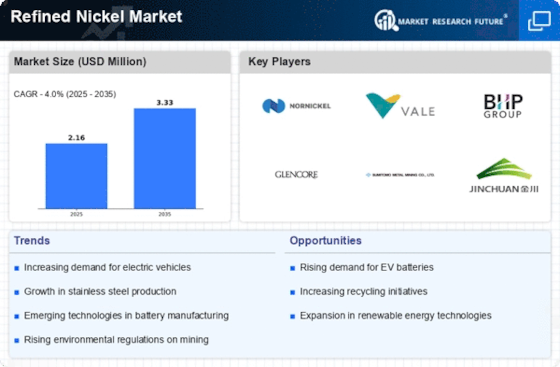Top Industry Leaders in the Refined Nickel Market
 The refined nickel market, a crucial component of the global supply chain, pulsates with intense competition amidst a dynamic landscape. Understanding the strategies employed by key players, factors influencing market share, industry news, and recent developments is vital for navigating this complex terrain. This report dives deep into the competitive landscape, offering a comprehensive analysis of the market's current state and future trajectory.
The refined nickel market, a crucial component of the global supply chain, pulsates with intense competition amidst a dynamic landscape. Understanding the strategies employed by key players, factors influencing market share, industry news, and recent developments is vital for navigating this complex terrain. This report dives deep into the competitive landscape, offering a comprehensive analysis of the market's current state and future trajectory.
List of Strategies Adopted by Key Players:
-
Vertical Integration: Leading players like BHP, Vale, and Glencore are consolidating their positions by integrating mining, refining, and trading operations. This vertical control ensures consistent supply, cost optimization, and increased bargaining power. -
Geographical Diversification: To mitigate risks and access new markets, companies are expanding their presence across continents. For instance, Tsingshan Group, a Chinese giant, is establishing nickel refining facilities in Indonesia and Europe. -
Technological Innovation: Investing in advanced technologies like hydrometallurgical processes and high-pressure acid leaching is crucial for efficient extraction and higher purity nickel production. Sumitomo Metal Mining is pioneering the use of biohydrometallurgy for environmentally friendly nickel extraction. -
Partnerships and Collaborations: Strategic partnerships with technology providers, equipment manufacturers, and research institutions are fostering innovation and reducing research and development costs. For example, BHP partnered with Tesla to develop a low-carbon nickel production process. -
Sustainability Focus: Increasing environmental and social consciousness is driving the adoption of sustainable practices. Vale's commitment to responsible sourcing and responsible nickel production is attracting environmentally conscious consumers and investors.
Factors Influencing Market Share:
-
Production Capacity: Companies with the largest refining capacity, like Tsingshan Group and Huayou Cobalt, hold a significant advantage in terms of market share and pricing power. -
Cost Competitiveness: Efficient production processes, access to low-cost resources, and economies of scale play a crucial role in determining cost competitiveness and market share. -
Quality and Purity: High-purity nickel is essential for advanced applications like batteries and electronics. Companies offering consistently high-quality nickel command premium prices and loyal customers. -
Brand Reputation: A strong brand reputation for reliability, sustainability, and ethical sourcing attracts customers and secures long-term contracts, boosting market share. -
Government Policies: Government policies on environmental regulations, export quotas, and subsidies can significantly impact production costs and market dynamics.
Key Players
- Norilsk Nickel
- Vale
- BHP
- Jinchuan Group International Resources Co. Ltd.
- Glencore
Recent Developments :
-
September 2023: The Indonesian government bans the export of nickel ore, aiming to promote domestic refining and value addition. This policy disrupts global nickel supply chains and triggers price hikes. -
October 2023: Vale signs a long-term nickel supply agreement with Tesla, securing a major customer for its sustainably sourced nickel production. -
November 2023: BHP and Glencore announce a joint venture to develop a nickel processing facility in Australia, showcasing the trend towards collaboration in the market. -
December 2023: The International Nickel Study Group (INSG) forecasts a global nickel surplus in 2024, easing concerns about supply tightness and potentially leading to price moderation.










